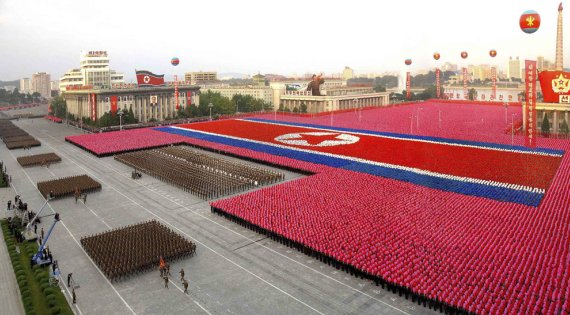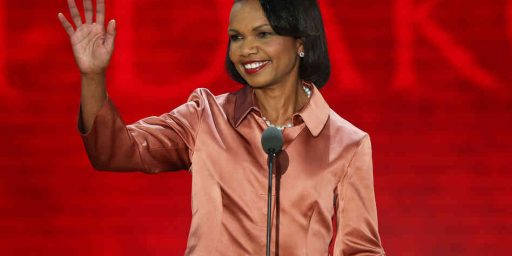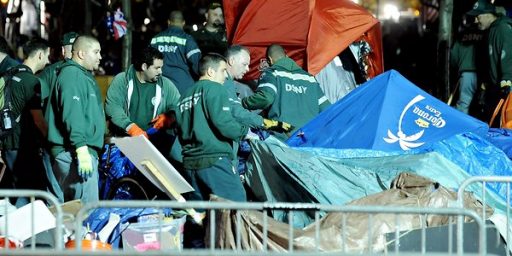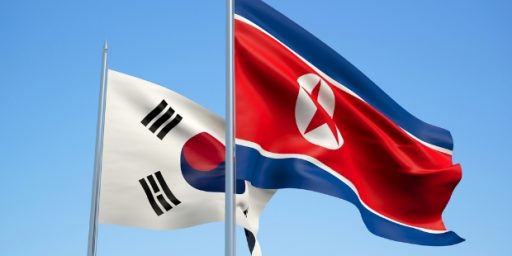Life In North Korea Still Sucks
The New York Times reports that the life of the average North Korean hasn’t improved much despite the supposed reforms enacted by their new leader:
In the 10 months since Kim Jong-un took the reins of his desperately poor nation following the death of his autocratic father, North Korea — or at least its capital — has acquired more of the trappings of a functioning society, say diplomats, aid groups and academics who have visited in recent months.
But in rare interviews this month with four North Koreans in this border city on government-sanctioned stays, they said that at least so far, they have not felt any improvements in their lives since the installment last December of their youthful leader — a sentiment activists and analysts say they have also heard. In fact, the North Koreans said, their lives have gotten harder, despite Mr. Kim’s tantalizing pronouncements about boosting people’s livelihoods that have fueled outside hopes that the nuclear-armed nation might ease its economically ruinous obsession with military hardware and dabble in Chinese-style market reforms.
Food prices have spiked, the result of drought and North Korea’s defiant launching of a rocket in April that shut down new offers of food aid from the United States. Development organizations also blame speculators who have hoarded staples in anticipation of reforms that have yet to materialize. The price of rice has doubled since early summer, and chronic shortages of fuel, electricity and raw materials continue to idle most factories, leaving millions unemployed.
“People were hopeful that Kim Jong-un would make our lives better, but so far they are disappointed,” said a 50-year-old named Mrs. Park, who like Mrs. Kim spoke on the condition that only her last name be used, fearing retribution when she returned home.
A member of the ruling Workers’ Party from a major city, Mrs. Park said that to feed her family, she sells cornmeal cakes from a market stall, but she complained of sluggish sales and famished children who snatch her wares from beneath a protective swatch of fabric. More than once this year, she said she walked by the lifeless bodies of those who were too weak to steal.
“I would have given them food if I had any,” she said, looking away with shame.
One tantalizing part of the interviews of these North Koreans is the glimpse it seems to offer into what the citizens of this isolated state think of their rules:
In two days of interviews with the North Koreans, a thinly concealed disgust over inequality that has risen in recent years — and a realization that the national credo of juche, or self-reliance, was a carefully constructed lie — was striking. While such feelings appear to be fed by the creeping availability of at least some information from the outside world, disillusionment mounted last spring after the government’s promised era of prosperity, slated to begin in April, went unfulfilled. The discontent seemed to solidify with the government’s rare admission of the failed rocket launching.
“We were led to believe that even dogs would eat rice cakes in 2012,” said Mrs. Kim, the pig farmer. Asked if she thought there were those who still believed in North Korea’s Stalinist, brutally enforced single-party system, she shook her head and said “zero.”
She and the others suggested that the information vacuum had been eased by the spread of cellphones (though sanctioned phones cannot call outside the country) and by South Korean soap operas that are smuggled across the border and secretly viewed despite the threat of prison. A 58-year-old retired truck driver from Sunchon, a city north of the capital, said he and his family locked their doors and covered their windows when watching the DVDs that offered glimpses of well-stocked supermarkets and glittering shopping malls.
“I wish we could have such a clean, shiny life,” he said, adding that few people he knows still believe the government propaganda that paints South Korea as far more impoverished than the North.
While he and the other North Koreans are not foolish enough to openly question their leaders at home, their personal reactions to the death of their former leader last December were telling. Upon hearing the news, Mrs. Kim instinctively bought a bouquet of white flowers and headed to a local government building, where throngs wailed before a large portrait of their Dear Leader. Mrs. Kim followed their lead, but admitted that her tears were not genuine.
(…)
The lucky few who make it to Dandong are stunned by what they find: the car-choked streets, hot showers and the ability to speak out without fear. But mostly, they are overwhelmed by the array and abundance of inexpensive food. While her compatriots said they stuffed themselves with meat-filled dumplings and rice, Mrs. Kim ate only apples for the first five days. She said she had not eaten them since childhood.
“I thought our country lived well,” she said, “but I was mistaken.”
The more Kim opens his country up to the outside, the more people will find that that they have been told for half a century now is a pathetic lie. What that means for the future of the regime only time will tell, but as we’ve seen elsewhere in the world openness to the outside is often the death knell for dictatorships.







It’s a mixed bag. The Chinese Communist Party is still going strong, as are some of the minor bit players like the Turkmen after the death of the Turkmenbashi, and Lukashenko in Belarus. Heck, even Castro is still going strong. I think almost all North Koreans are nowadays under no illusion that their country is a true heaven on earth like their propaganda tells them. As long as the Army backs the Kims, everything will stay the way it is.
The people can call for openness all they want. But the army has guns and food (and what little food aid is going to the country goes to them). The people do not. And they don’t have any cognitive dissonance on firing on their own people.
I thought that an interesting side note in the article was the idea that, for these people, China is an open country where food plentiful and they are free to speak their minds and practice their religion.